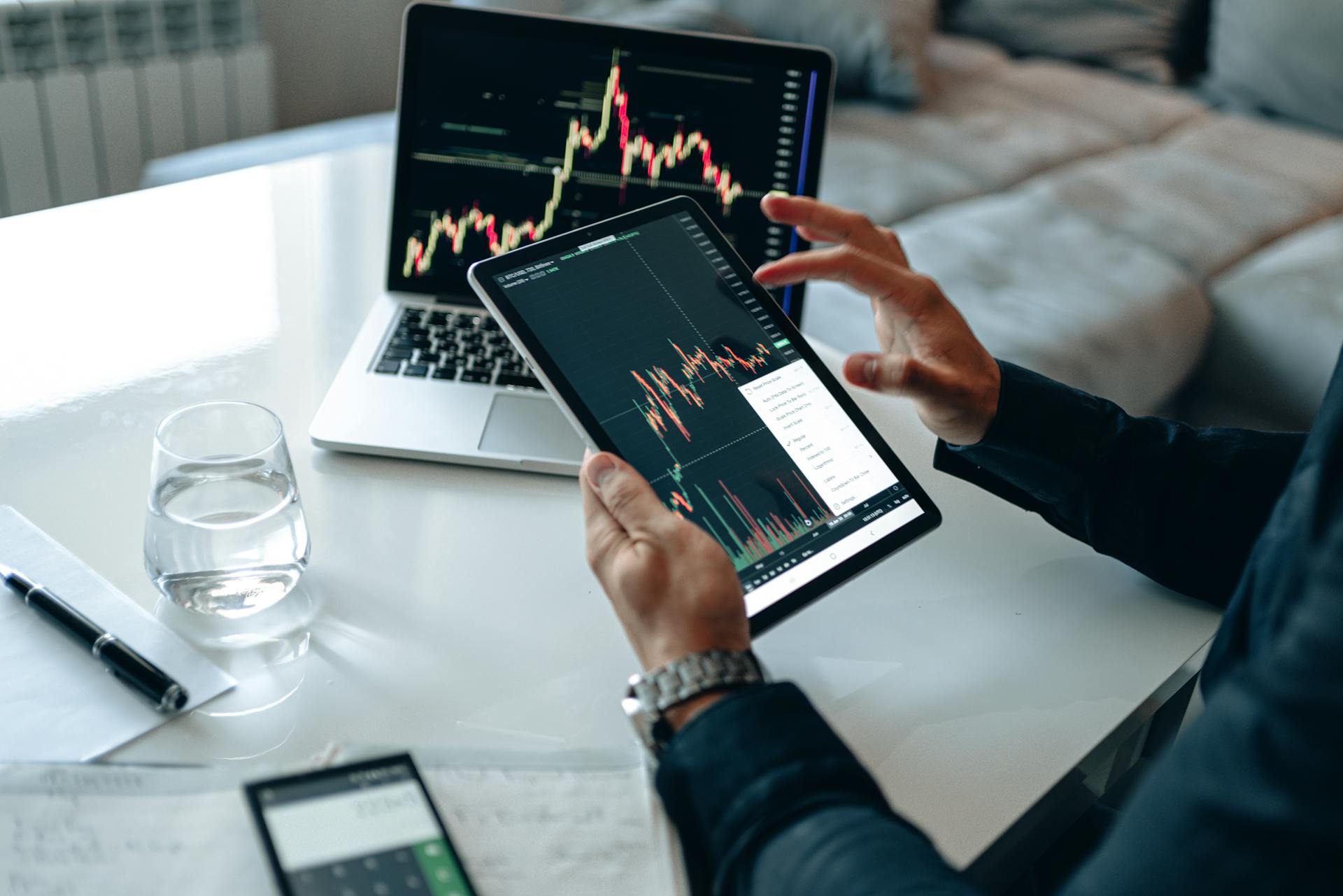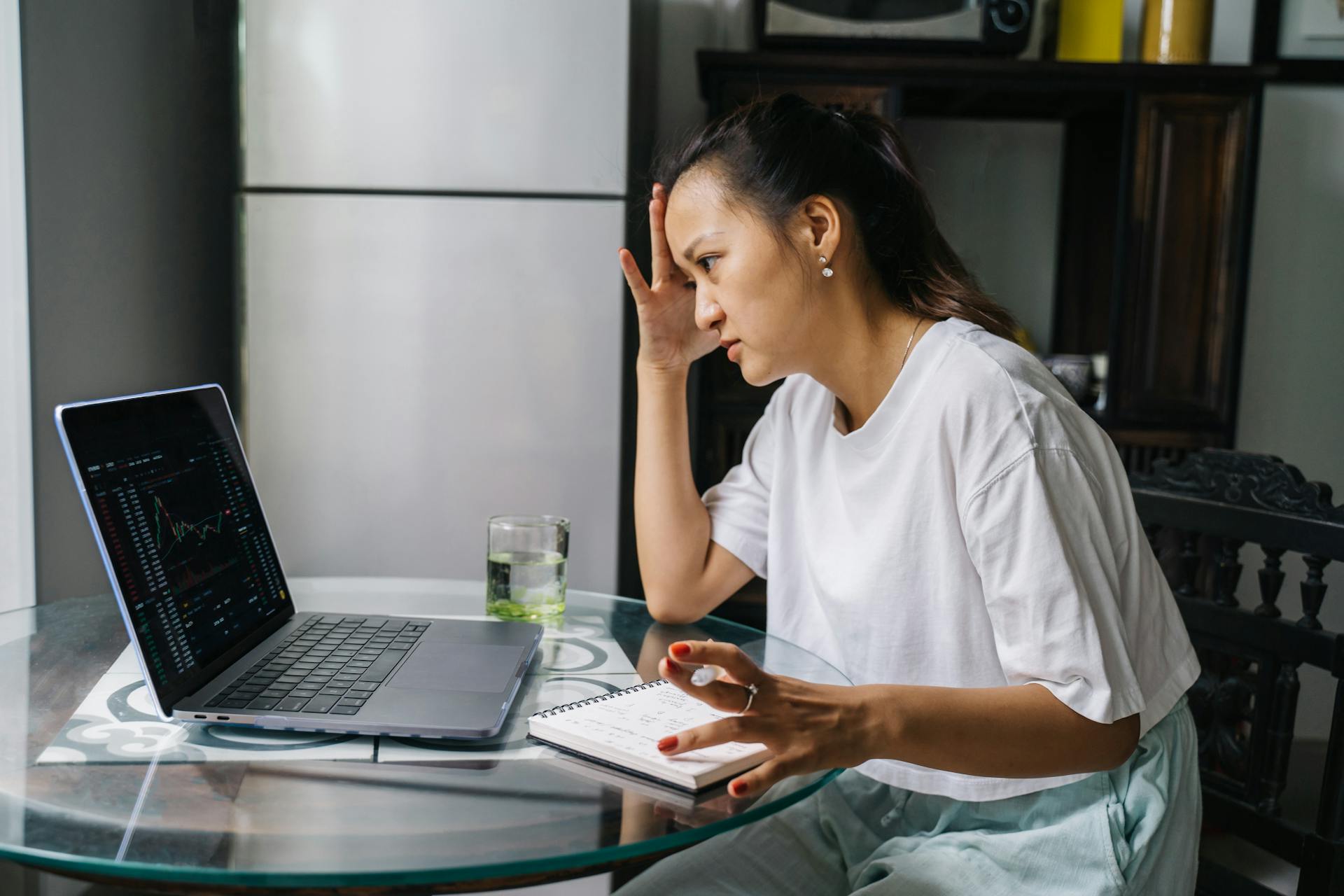
Cryptocurrency in Nigeria has gained significant attention in recent years, with many Nigerians investing in digital currencies like Bitcoin and Ethereum. The country's growing tech-savvy population and increasing internet penetration have created a fertile ground for cryptocurrency adoption.
The Nigerian government has taken a cautious approach to regulating cryptocurrency, neither fully embracing nor banning it. This ambiguity has led to a complex market, where both opportunities and risks abound.
Many Nigerians are drawn to cryptocurrency as a means of diversifying their portfolios and potentially earning higher returns. According to a survey, over 70% of Nigerian cryptocurrency investors are motivated by the potential for higher returns.
However, the lack of clear regulations and oversight has also led to concerns about the security and legitimacy of cryptocurrency transactions in Nigeria.
What Is It?
Cryptocurrency is a digital representation of a value or of a right.
It can be transferred and stored electronically using distributed ledger technology, which allows multiple parties to share and update a common ledger without relying on a central authority.
Records of transactions are called blocks and they make up a blockchain.
The origin of cryptocurrency can be traced back to 1989 when DigiCash, a company in the Netherlands, launched a digital currency called “eCash”.
Although eCash didn’t survive, it influenced blockchain developments.
Bitcoin, the first and best-known cryptocurrency, was launched in 2009 by an anonymous person or group using the pseudonym Satoshi Nakamoto.
All other cryptocurrencies aside from Bitcoin are called Altcoins and each has unique features.
Cryptocurrencies exist outside the control of governments and central authorities.
Cryptography ensures secure online payments without intermediaries.
They hold value based on market demand and adoption.
Nigeria's Crypto Landscape
Nigeria's economic turbulence has pushed many Nigerians towards Bitcoin and stablecoins, with digital token adoption surging 9% year-over-year to $56.7 billion between July 2022 and June 2023.
The naira's value dropped considerably in June and July 2023, making digital assets an attractive option for Nigerians seeking financial predictability.
Stablecoins, in particular, have become a key part of Nigeria's crypto story, offering a hedge against inflation and currency devaluation.
Nigeria: Sub-Saharan Africa Hub
Nigeria is leading the way in Sub-Saharan Africa's crypto story, driving substantial on-chain activity and positioning the region as an increasingly influential hub for cryptocurrency adoption and financial technology.
Stablecoins have become a key part of Nigeria's crypto story, a welcomed hedge against long-standing inflation and currency devaluation, now accounting for a majority of crypto transactions across the continent.
Nigeria's Central Bank initially barred financial institutions from cryptocurrency transactions in February 2021, but the Nigerian Securities and Exchange Commission later published a framework for regulating cryptocurrency trading in May 2022.
The Central Bank backtracked in November 2022, and then banned person-to-person cryptocurrency trading in the naira in May 2024.
Despite regulatory challenges, Nigeria is making significant progress in establishing a regulatory framework for cryptocurrencies, alongside other countries like South Africa, Ghana, Mauritius, and Seychelles.
Nigeria's Management
Nigeria needs a balanced approach to regulation to manage cryptocurrency effectively. This balanced approach will ensure the industry thrives without harming financial and monetary stability.
A stable financial system is capable of allocating resources efficiently and managing financial risks. This is crucial for Nigeria's economy, which has been experiencing significant economic turbulence.
The regulatory framework passed by the Securities and Exchange Commission in May 2022 provides for tracking the identities and activities of users of crypto-exchanges. This is a significant step towards addressing concerns raised by Nigerian authorities.
Regulators can ask exchanges to disclose the identities of cryptocurrency account (wallet) holders linked with suspicious activities. Blockchain analytics firms like Chainalysis and Elliptic work closely with exchanges to uncover sinister transactions.
Nigeria's cryptocurrency transactions swelled 9% year-over-year, reaching $56.7 billion between July 2022 and June 2023. This growth in digital asset adoption is a significant trend in the country's crypto landscape.
To manage cryptocurrency effectively, Nigeria should adopt international standards for crypto-asset activities. This will enable regulators to get information from foreign exchanges providing wallets to their citizens.
The Financial Stability Board has recommended that regulatory authorities share information on suspicious transactions on foreign cryptocurrency exchanges. If all regulators worldwide adopt international regulation, the outcomes would be consistent.
Here are some key statistics on Nigeria's crypto landscape:
NairaEx
NairaEx is a Nigeria-based cryptocurrency exchange that has been providing a fuss-free way for Nigerians to access the global crypto market since 2015. It's been around for a while, which is a good sign.
The platform allows users to buy and sell Bitcoin with Nigerian naira. With a user-friendly interface and competitive pricing, NairaEx offers a straightforward entry point if you're new to crypto.
One of the best things about NairaEx is that it has no trading fees. This means you can trade without worrying about extra costs eating into your profits.
Users can deposit and withdraw Nigerian naira, making it easy to manage your funds. Deposits can be made using bank transfers, card payments, and even cryptocurrency.
Here are the deposit and withdrawal methods available on NairaEx:
Factors Promoting Use
Nigeria's economic turbulence, particularly the devaluation of the naira, has pushed many Nigerians towards cryptocurrencies like Bitcoin and stablecoins. This is evident in the 9% year-over-year growth in cryptocurrency transactions in Nigeria, reaching $56.7 billion between July 2022 and June 2023.
The official exchange rate in Nigeria is set by the Central Bank, which tends to devalue the naira against other currencies. This has caused Nigerians to look for alternative ways to preserve the value of their money.
Transferring money from and to Nigeria is very costly using the traditional banking system, making cryptocurrency an attractive alternative. In fact, many Nigerians have switched to using peer-to-peer transactions, which bypass traditional banks entirely.
The freezing of bank accounts for cryptocurrency-related activities has also led to increased use of digital currencies, with many Nigerians saying they will continue to use cryptocurrencies where they can.
Here are some key factors that promote the use of cryptocurrencies in Nigeria:
- Devaluation of the naira
- High fees associated with traditional banking
- Freezing of bank accounts for cryptocurrency-related activities
These factors have contributed to the growth of cryptocurrencies in Nigeria, with stablecoins becoming a key part of the country's crypto story.
Regulatory Environment
The regulatory environment in Nigeria is complex and has been evolving over time. The Central Bank of Nigeria (CBN) has the sole right to issue the Naira, Nigeria's legal tender, and has warned citizens about the risks of cryptocurrencies.
The CBN has instructed banks not to facilitate transactions related to cryptocurrencies, but this ban has not been heavily enforced. In fact, cryptocurrency-related companies are not forbidden in Nigeria, making the legal status of cryptocurrencies ambiguous.
Here are some key regulatory facts to keep in mind:
- The CBN has cited its need to protect the public from threats by unregulated activities that are potential areas of illegal operations.
- The Nigerian Securities and Exchange Commission (SEC) has issued regulations for digital assets, positioning them as securities.
- Exchanges dealing in digital assets must obtain a clearance of "no objection" from the SEC to operate legally.
- Registered exchanges have a fee of 30 million naira (equivalent to $72,289) and other associated charges.
The Nigerian government's relationship with cryptocurrencies has been tenuous, with a ban imposed in 2021, but later rolled out a series of regulations for digital assets.
Legality
The legality of cryptocurrencies in Nigeria is a bit of a gray area. The Central Bank of Nigeria Act 2007 gives the CBN the sole right to issue Naira, and there is no legal framework addressing cryptocurrencies.
In 2016, the CBN and NDIC set up a commission to look into Bitcoin, but it didn't lead to any concrete regulations. The Nigerian Securities and Exchange Commission (SEC) issued a warning in 2017 that no companies or entities involved with cryptocurrencies are recognised or authorised.
The CBN issued banks with instructions to not hold, transact, or use virtual currencies, and to report suspicious transactions to the Nigerian Financial Intelligence Unit. However, the ban on banks facilitating cryptocurrency-related transactions was not heavily enforced.
The CBN has tried to place a ban on cryptocurrencies, but hasn't done so. According to the CBN's research department, the warnings are designed to educate citizens about the risks of cryptocurrencies.
Regulator-Registered
Nigeria-based exchanges must comply with a local regulator's anti-money laundering (AML) and counter-terrorism financing (CTF) reporting obligations.
You can usually buy crypto with NGN, which is a plus for those who prefer to use their local currency.
Exchanges in Nigeria typically support local payment methods, making it easier to get started.
You may be able to access local customer support, which can be a big advantage if you have questions or issues.
However, you'll need to provide your personal details and proof of ID, which may be a disadvantage if you want to trade anonymously.

Overseas trading platforms may provide better liquidity, but this comes with its own set of risks and considerations.
NGN-to-crypto prices are sometimes slightly higher than USD-to-crypto prices, meaning you sometimes pay a premium for buying directly with Nigerian nairas.
Some features are simply not available on local regulator-registered exchanges, such as margin trading, DeFi features, and some altcoins.
Here are some key benefits and drawbacks to consider:
- Compliance with local AML and CTF reporting obligations
- Ability to buy crypto with NGN
- Support for local payment methods
- Local customer support
- Subject to local laws
- Need to provide personal details and proof of ID
- Potential for higher NGN-to-crypto prices
- Limited features and altcoins available
Frequently Asked Questions
What is Nigeria ranked in cryptocurrency?
Nigeria ranks second globally in cryptocurrency adoption. The country received approximately $59 billion in cryptocurrency value between July 2023 and June 2024.
Sources
- https://www.chainalysis.com/blog/subsaharan-africa-crypto-adoption-2024/
- https://en.wikipedia.org/wiki/Cryptocurrency_in_Nigeria
- https://theconversation.com/naira-is-in-crisis-but-cryptocurrency-isnt-to-blame-nigeria-needs-consistent-policy-230389
- https://bitcoinist.com/nigerias-crypto-adoption-continues-to-surge-report/
- https://www.finder.com/cryptocurrency/exchanges-nigeria
Featured Images: pexels.com


